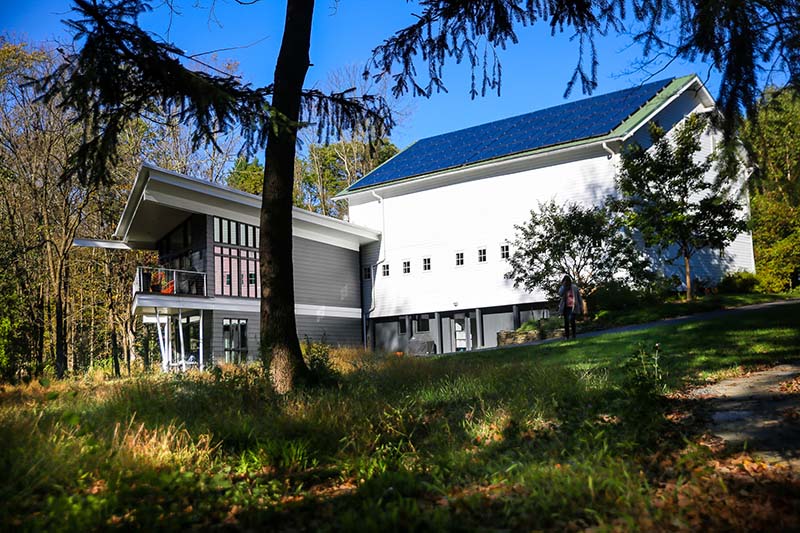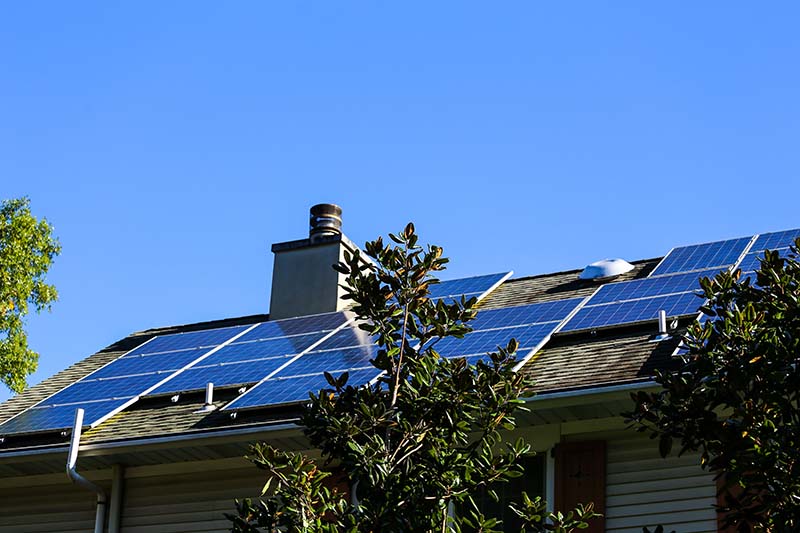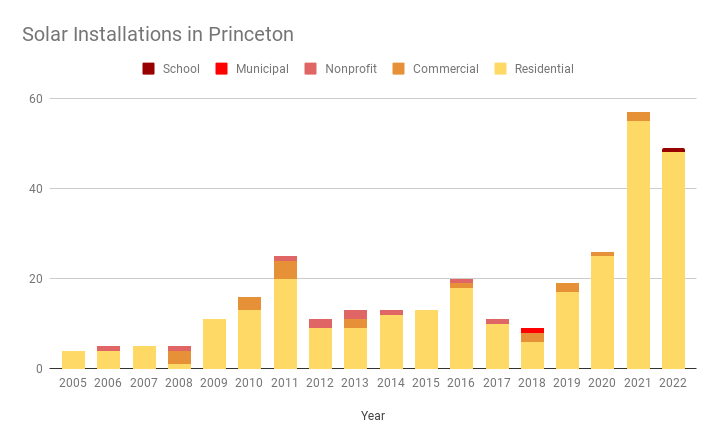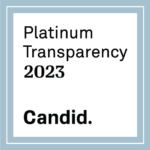Solar is booming in New Jersey. Whether you want to install your own panels or battery backup, there are many options to consider.
Join the revolution and harness electricity from the sun.
Are solar panels right for your home or building?
In order to answer this question, solar installers will assess your roof’s characteristics, including:
- Shade: Use Google’s Project Sunroof to understand your property’s shade. If healthy trees are preventing solar, be sure to consider the benefits of your trees before removing them.
- Direction: Panels are most effective on a south-facing roof, though east and west-facing roofs may be candidates if they receive enough sunlight.
- Age: Panels are best installed on a newer roof to simplify roof maintenance.
- Size: A general rule of thumb is that 100 square feet of roof space provides one kilowatt of electricity.
- Type: Slate and wood roofs are often not suitable for solar installations, but asphalt, metal, and clay are typically compatible, as are flat roofs covered in rubber or plastic.
- Suitability: Check with PSE&G to ensure the nearby electric circuits are suitable for new solar capacity.
- Preservation: If you live in a designated historic district or site, be sure to check with the Office of Historic Preservation.

To buy or to lease panels?
When you buy a solar photovoltaic (PV) system, you own the system, enjoy the monthly electricity savings, and receive rebates and incentives. Solar system expenses commonly reach $15,000 to $30,000, but rebates & incentives can reduce the upfront cost dramatically. Depending on circumstances, the return on your investment can be impressive — some homeowners pay for the system within eight years but keep the panels for 25-30 years.
So, what exactly are these savings, and who provides them? Here’s the breakdown for a New Jersey homeowner:
- Net metering: If approved by your utility, this New Jersey program allows you to sell excess electricity back to the grid at the retail rate.
- Investment Tax Credit (ITC): The ITC currently allows panel owners to deduct 26% of a solar installation cost from their federal taxes. Be aware, the ITC is scheduled to decrease to a 22% tax credit in 2022, and completely disappear in 2023.
- Property Tax Incentive: New Jersey allows panel owners to deduct 100% of the value added by a renewable energy system — as determined by a local Tax Assessor — from their local property taxes.
- Transition Solar Renewable Energy Certificate (TREC): Here in New Jersey, you also generate income from your panels — one TREC for every megawatt-hour of electricity created by your panels. TRECs can be sold in the market. To learn more, visit trecsnj.com.
- Sales Tax Exemption: New Jersey does not charge sales tax on solar energy equipment.
Finally, another option is to lease a solar PV system. In this scenario, there are zero upfront costs and your electricity bill will decrease or even disappear, while the third-party owner collects the other benefits to offset their installation cost.
Commercial properties in New Jersey can enjoy these same incentives. However, Nonprofits don’t receive the Investment Tax Credit and may struggle to justify the upfront costs. For this reason, Nonprofits commonly pursue a lease or power purchase agreement (PPA). For more information, visit the Energy Sage Solar for Nonprofits webpage.
The EnergySage Solar Marketplace can help home and business owners find and evaluate the solar options, including finding installers and reviewing loan or lease options.
What about battery backup?
Energy storage systems offer the ability to provide power to part or all of your home. When coupled with solar, battery backup systems can store generated energy and provide power when the sun isn’t shining. Batteries can also be used with PSE&G’s Residential Load Management Service to purchase energy from the grid during off-peak times, potentially returning even more money to your pocket.
Check the EnergySage website to learn about different battery storage systems currently available.

Ground-mounted panels: Another approach.
If rooftop solar isn’t right for your home and you have sunny open space on your property, there are two options for ground-mounted panels to consider. Standard ground mounts contain a metal frame to hold the panels at a fixed angle. Pole-mounted solar systems are raised on a pole, and many offer tracking systems to automatically rotate the panels toward the sun. Ground-mounted panels tend to be more productive panels since they can be installed at the ideal angle and, due to being easily accessible, are more convenient to maintain.
Early in your consideration process, be sure to investigate your local building codes and zoning restrictions. Princeton residents should start with the Zoning department. Learn more about ground-mounted solar panels via this EnergySage website.
Solar shingles: Give your roof a new function.
While traditional rectangular rooftop solar panel arrays are booming in New Jersey, building-integrated photovoltaics (BIPV), a new technology that integrates solar into your home, are also showing up in the market.
Unlike historic panels that are added on top of a shingled roof, these solar-enabled glass shingles protect your roof while also generating renewable energy for your home.
Several companies are now promoting solar tiles, including RGS Energy, SunTegra, and Tesla. Be sure to check your local building codes, prior to proceeding with these new and upcoming technologies.
Did you know?
- What a bright idea! Since 2004, over 120 homes, businesses, nonprofits in Princeton have installed rooftop or ground-mounted solar photovoltaic arrays.
- The energy of the future: In New Jersey, over 66,000 solar projects have been installed over the past two decades.
- A solar powerhouse. With the ability to power half a million homes, New Jersey is ranked No. 1 in the United States for a total installed solar capacity per square mile.
- Good planning. The Hopewell Valley Central High School has a battery backup system that allows it to act as a warming and cooling center during power outages.
- Going big. The Solaire, a residential building in downtown Manhattan, was one of the first buildings in the U.S. to integrate solar functionality into its exterior walls.

Did you know?
- Go Jersey. New Jersey’s SREC market is the largest in the nation.
- Get paid for doing the right thing. Homeowners with panels typically earn six to eight TRECs per year, each currently valued at around $100 in New Jersey.
- Support from the system. Electricity suppliers buy TRECs to help them meet the requirements in New Jersey’s Solar Renewable Portfolio Standard. With the goal of 50% of electricity from renewable sources by 2030, they’re motivated.


